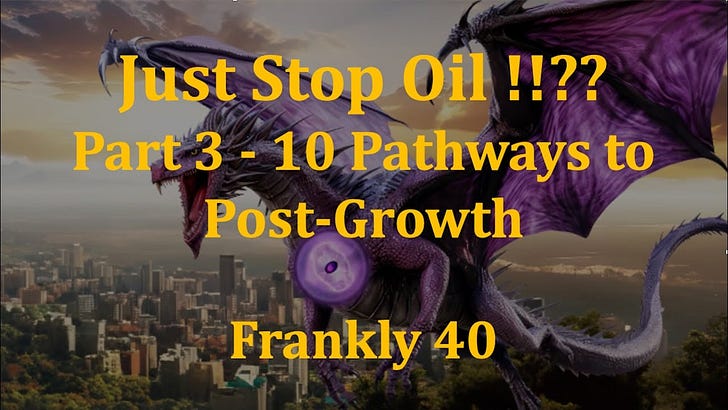I don’t know the future. But I do know that IF we arrive at a post-growth, (significantly) lower carbon future, there are certain bottlenecks we will first have to pass through. The conventional stories on how lower emissions will arrive: better tech, more renewables, public recognition of existential climate risk – viewed from the perspective of the energy hungry superorganism that is the global economic system – will not work – they will result in larger not smaller environmental impact – though we should consider this scenario - what I call 'The Mordor Economy' - as the default trajectory.
This 20+ min reflection begins with listing the ‘4 Horseman of the 2020s’ which will have to be navigated under ANY post growth scenario. Then I articulate 10 possible ways how society might arrive to a post-growth future – these are not predictions, nor recommendations - just ways I've imagined that it could happen. The simple - and important - takeaway is that in addition to fighting for lower carbon ways of living, we are going to also have to prepare for lower energy/material throughput, more local/regional, and more (intensely) social futures. Which for the most part we are not. How to think about and act on those eventualities - which would definitely use 'less oil' will be the subject of Part 4 of this video series. It's time (many) more people link the climate crisis, with the meta-crisis, with the biophysical phase shift of global economies.
In case you missed it…
This week, I was joined by climate scientist Kevin Anderson to unpack the options we have for averting severe climate outcomes and how these are interconnected with equity. As nations plan their climate goals and coordinate with each other, it’s clear that extreme actions would be needed from everyone to meet the goal of keeping the global average temperature increase below 2ºC - if this even remains possible. At the same time, there are wide disparities in the greenhouse gas emissions between the materially wealthiest and poorest within and across countries. How are past (carbon and energy) inequities already affecting people in climate impacted zones?
If you appreciate The Great Simplification podcast…
Be sure to leave a review on your preferred podcast platform! Leaving reviews helps the podcast grow, which helps spread awareness of our systemic situation from experts in ecology, energy, policy, economics, technology, and community building so that we can better understand - and respond to - the challenges of the coming decade.
The Great Simplification podcast is produced by The Institute for the Study of Energy and Our Future (ISEOF), a 501(c)(3) organization. We want to keep all content completely free to view globally and without ads. If you’d like to support ISEOF and it’s content via donation, please use the link below.





